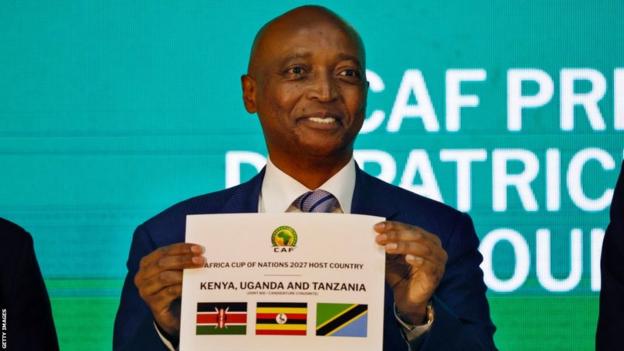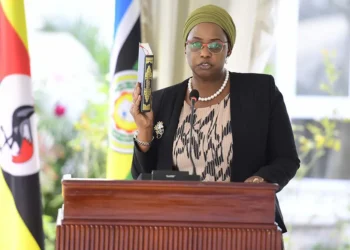NAIROBI, KENYA | NOW THEN DIGITAL — Tanzania, Kenya, and Uganda, collectively known as the East African Community (EAC), secured the rights to host the Africa Cup of Nations finals in 2027, as announced by the Confederation of African Football (CAF).
Competing against strong contenders, including Egypt (hosts of the 2019 tournament), Algeria (2023 CHAN tournament hosts), Nigeria, Benin, and Botswana, the EAC Pamoja bid emerged victorious.

Patrice Motsepe, the president of CAF, unveiled the decision following an executive meeting held in Cairo, expressing optimism for African football’s future. He boldly stated, “The future of African football has never been brighter…in the near future an African nation will win the World Cup.”
The winning bid was a collaborative effort among the three East African nations, collectively referred to as the ‘EAC Pamoja Bid.’ Representatives from Tanzania, Kenya, and Uganda, including sports ministers and football governing body leaders, were present in Cairo to witness the announcement.
In a separate development, Morocco was awarded the hosting rights for the 2025 edition of the Africa Cup of Nations after Nigeria and Algeria withdrew their bids. Consequently, Kenya, Uganda, and Tanzania automatically qualified for the 2027 edition as the designated hosts.
Motsepe expressed enthusiasm about the upcoming tournament, emphasizing the dedication and commitment shown by the presidents of the three countries in the region.
Regarding the Tanzanian segment of the bid, the Benjamin Mkapa National Stadium, a Caf-certified venue currently undergoing renovations, was selected. Additionally, Tanzania is considering improvements to the Azam Sports Complex – Chamazi, the CCM Kirumba Stadium in Mwanza, and several venues in Dodoma, Arusha, and Zanzibar to meet Caf standards.
Kenya’s proposed enhancements focus on the Moi International Sports Centre in Kasarani, Nyayo Stadium in Nairobi, and the Kipchoge Keino Stadium in Eldoret. Uganda, on the other hand, offered Namboole Stadium as a key venue, with plans to invest in venues outside the capital, including Buhinga in Fort Portal, Akii Bua in Lira, and Kakyeka in Mbarara.
Caf stipulates that match venues should be in proximity to an airport, a level five hospital, and a five-star hotel. Additionally, host countries must provide six stadiums to accommodate the 24 participating teams, aligning with Cameroon’s approach as the 2021 Afcon hosts, which featured three new stadiums with capacities ranging from 20,000 to 60,000 seats in four cities.
Meeting Caf requirements entails having at least three training grounds near match venues that meet Caf standards. Furthermore, stadiums must install turnstiles at all gates, CCTV monitors, well-demarcated padded VIP and VVIP seats, and facilities such as a media center, media tribune, and a press conference room for 50 media personnel.
Other essentials include a mixed zone, photographers’ area, OB van area, and a VAR operation room.
It is worth noting that Kenya previously won bids to host the 1996 Afcon edition and the 2018 Africa Nations Championship finals, but both times lost hosting rights due to venue unpreparedness.
Historically, only two Cecafa countries have hosted the Afcon, with Sudan hosting in 1957 and 1970, and Ethiopia hosting in 1962, 1968, and 1976.
2027 CAF Africa Cup of Nations hosts: SET! 👏
Kenya, Uganda & Tanzania. ✅ pic.twitter.com/dQ5ZgHUSpz
— CAF (@CAF_Online) September 27, 2023

















